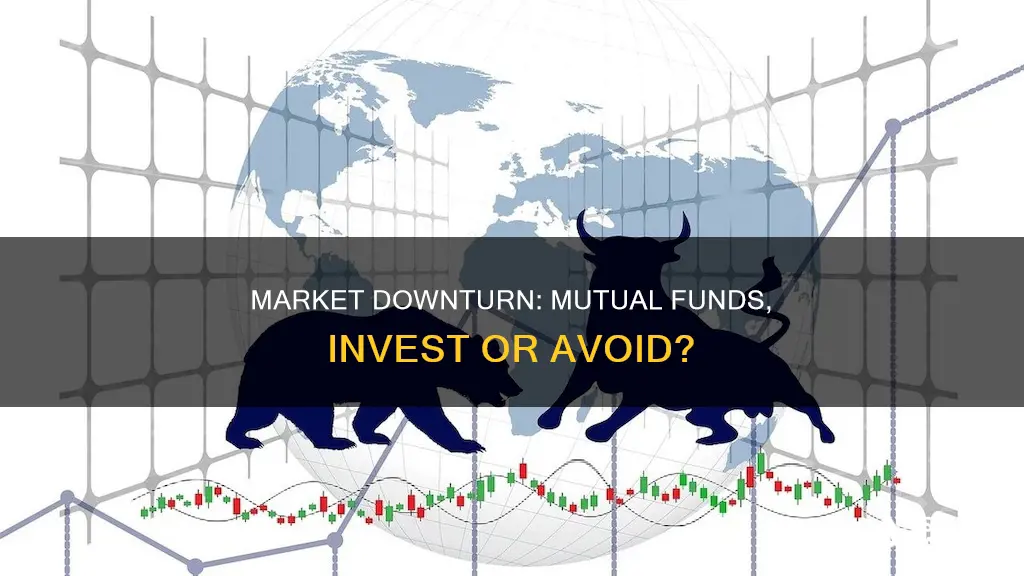
Investing in mutual funds when the market is down can be a great opportunity to get more for your money. The idea of investing when markets are down is that you get to purchase a higher number of shares or units of mutual funds, which means you will acquire more for less, and when the prices rise, you will make more profit. However, timing the market is not easy, and it is impossible to predict market movements. Therefore, instead of focusing on timing the market, investors should remain disciplined and continue to invest in equity mutual funds irrespective of market fluctuations.
| Characteristics | Values |
|---|---|
| Should I invest in mutual funds when the market is down? | Yes, but don't focus on timing the market. |
| What are the benefits of investing when the market is down? | You can purchase more units of the scheme for less money, and when the prices rise, you will make more profits. |
| What are the risks of investing when the market is down? | The market could go down even further. |
| What is a good strategy for investing in mutual funds? | Systematic Investment Plan (SIP) is recommended. Focus on your financial goals and risk profile, rather than short-term market fluctuations. |
| How can I build a strong portfolio? | Diversify your portfolio with a mix of bond and equity funds to weather different economic conditions. |
What You'll Learn

Advantages of investing in mutual funds when the market is down
When the market is down, many investors panic and start selling their shares or units of mutual funds. However, investing in mutual funds when the market is down has several advantages.
Firstly, when the market is down, you can purchase a larger number of shares or mutual fund units at a lower price. This means that when the market eventually recovers and prices rise, you will make higher profits.
Secondly, investing regularly over the long term is the key to maximising your returns. By investing in mutual funds when the market is down, you can take advantage of the power of compounding. The earlier you start investing, the more time your investments have to grow, and the larger your corpus will be.
Thirdly, equity markets are volatile by nature, and short-term fluctuations should not deter long-term investors. When you invest in mutual funds, you are investing in a diversified portfolio of multiple stocks, which reduces the risk of significant losses.
Additionally, when the market is down, it can be an opportunity to buy rather than sell. A down market allows you to build your portfolio at a discount, and you can take advantage of attractive valuations.
Finally, investing in mutual funds when the market is down can help you focus on your investment goals without getting distracted by short-term market movements. It is important to have faith in your fund managers and investment advisors and maintain a disciplined approach to investing.
The Social Security Trust Fund: Where is it Invested?
You may want to see also

Disadvantages of investing in mutual funds when the market is down
Investing in mutual funds when the market is down can be a risky strategy due to several disadvantages. Here are some key drawbacks to consider:
Market Risk and Uncertain Returns
Mutual funds are subject to market risk, meaning their value can fluctuate with the stock market. When the market is down, there is a possibility of further decline, and timing the market is challenging. Investing in mutual funds during a market downturn could result in losses if the market continues to fall. Mutual funds also do not offer guaranteed returns, and their value is reflected in the Net Asset Value (NAV), which fluctuates daily. A drop in NAV after investing translates to a loss.
Fees and Expenses
Mutual funds charge various fees, such as management fees and transaction fees, which can eat into investment returns. Some funds have high expense ratios, and investors should be cautious of funds with ratios above 1.50%. Additionally, funds may have sales loads or commissions, further increasing costs. These fees can significantly impact overall investment returns, especially over the long term.
Tax Implications
Mutual funds generate taxable income through dividends and distributions. These payouts may result in unexpected tax bills, especially for investors in high-tax brackets. The tax implications can offset the gains from investing in mutual funds when the market is down.
Complexity and Limited Control
Mutual funds can be complex investment vehicles, making it challenging for investors to fully understand their risks and fees. Additionally, investors have limited control over the specific investments made by the fund manager. While diversification is a benefit, excessive diversification can increase costs and reduce the potential for high returns from individual stocks.
Fund Manager Risk
The performance of a mutual fund is closely tied to the decisions made by the fund manager. Short-term bets, analytical biases, or the departure of a fund manager can impact the fund's performance. Investors' money is dependent on the expertise and stability of the fund manager, introducing an element of risk.
In conclusion, while investing in mutual funds when the market is down may seem like a strategic move, it is essential to consider these disadvantages. Market timing is challenging, and the potential risks and costs associated with mutual funds during a market downturn can outweigh the potential benefits. Investors should carefully evaluate their financial goals, risk tolerance, and the specific characteristics of the mutual fund before making any investment decisions.
Lump Sum Mutual Fund Investments: Good Idea or Not?
You may want to see also

Long-term investment goals
Investing in mutual funds when the market is down can be a good idea if you are focused on your long-term investment goals. Here are some key points to consider:
Long-term Investment Strategy
The key to successful investing is to focus on your long-term goals and not get too caught up in the short-term fluctuations of the market. As the old adage goes, "don't try to time the market." It is impossible to predict market movements accurately. Instead, adopt a disciplined approach and invest regularly, regardless of whether the market is up or down. This strategy is known as "dollar-cost averaging," and it helps to maximise your returns over time.
Benefits of Investing When the Market is Down
When the market is down, you can purchase more units of a mutual fund for the same amount of money. This means that when the market eventually recovers, you will make higher profits. Of course, there is always the risk that the market could go down further, but if you are investing for the long term, these short-term movements will not significantly affect your overall returns.
Diversification and Risk Management
To build a resilient portfolio, it is essential to diversify your investments across different asset classes and sectors. Mutual funds are a great way to achieve diversification because they allow you to invest in a basket of stocks or other assets. This reduces the risk associated with investing in individual stocks, as the impact of any one stock's performance is diluted.
Systematic Investment Plans (SIPs)
SIPs are a highly recommended mode of investing in equity mutual funds. By investing a fixed amount at regular intervals, you can take advantage of market fluctuations. When the market is down, your fixed amount will buy more units, and when the market is up, you will buy fewer units. This helps to average out your purchase cost and maximise your returns over time.
Patience and Discipline
Building wealth takes time and discipline. It is important to set clear investment goals and stick to your plan, even during periods of market volatility. Remember that short-term market movements are unpredictable and often sharp, but over a more extended period, the volatility subsides, and the returns are more consistent.
In summary, if you are focused on your long-term investment goals, investing in mutual funds when the market is down can be a smart strategy. The key is to adopt a disciplined approach, diversify your portfolio, and invest regularly, regardless of short-term market movements. By doing so, you can take advantage of market fluctuations and maximise your returns over the long term.
Cion REIT: A Smart Investment Fund Move?
You may want to see also

Systematic Investment Plans (SIPs)
SIPs operate on the principle of Rupee Cost Averaging (or Dollar-Cost Averaging in the US). This means that when the market is low, you buy more units, and when the market is high, you buy fewer units, averaging out the cost of acquisition. As a result, investors can benefit from market volatility without the stress of timing the market. For example, if you invest a fixed amount of ₹1,000 every month for 5 months, you will buy more units when the market is low and fewer when it is high. This averages out the cost per unit and helps to maximise returns.
SIPs offer a disciplined and convenient approach to investing. They are automated, with investors giving their bank standing instructions to debit their account at regular intervals. This helps investors stay committed to their investment goals without worrying about market timing. SIPs also offer flexibility, allowing investors to change the amount or frequency of their investments as needed.
SIPs are a passive investment strategy, meaning that once you put your money in, you continue to invest regardless of performance. Therefore, it is important to monitor your wealth accumulation and reconsider your investment strategy as you approach your financial goals or retirement. While SIPs can be stopped or paused at any time, there may be penalties for early withdrawal, such as sales charges or exit load fees.
In conclusion, Systematic Investment Plans (SIPs) are a popular and disciplined way to invest in mutual funds, offering investors a convenient and flexible strategy to benefit from market volatility. By investing a small amount regularly, investors can take advantage of Rupee Cost Averaging (or Dollar-Cost Averaging) to maximise their returns over the long term.
Mutual Funds: Investing in India from the USA
You may want to see also

Diversified portfolios
Investing in mutual funds when the market is down can be a good idea, as you can purchase more units for less money, and when prices rise, you will make more profit. However, timing the market is challenging, and it is impossible to predict market movements. Therefore, it is recommended to focus on investing regularly and maintaining discipline, irrespective of market fluctuations. This is where the importance of a diversified portfolio comes into play.
A diversified portfolio is a strategic investment approach that involves allocating your investments across various financial instruments, industries, and geographic regions. By spreading your investments, you reduce the risk of losing money when the market is down. Here are some benefits of diversified portfolios and tips on how to create a robust one:
- Risk Mitigation: Diversification helps to reduce the impact of market volatility on your investments. When you invest in multiple assets, the poor performance of one investment is likely to be offset by the positive performance of another. This minimises the potential losses in your portfolio.
- Long-Term Growth: A diversified portfolio allows you to participate in the growth of different market sectors. By investing in a range of assets, you increase your chances of capturing the gains in various growing sectors of the economy. Over time, this can lead to more substantial returns than solely focusing on a single type of investment.
- Stability and Peace of Mind: Diversification provides stability to your portfolio. When you have a mix of investments, you are less likely to be significantly affected by the ups and downs of any single market or industry. This stability gives you peace of mind and helps you avoid impulsive decisions driven by short-term market fluctuations.
- Mutual Funds for Diversification: Mutual funds themselves offer built-in diversification as they pool money from multiple investors to purchase a diverse array of assets. By investing in mutual funds, you instantly gain exposure to a basket of carefully selected stocks, bonds, or other securities. This inherent diversification makes mutual funds a powerful tool for creating a well-balanced portfolio.
- Asset Allocation: Diversify across different asset classes such as stocks, bonds, cash, and alternative investments. Each asset class has its own unique characteristics and behaves differently in various market conditions. A mix of assets can provide a balance between potential returns and risk management.
- Industry and Sector Diversification: Spread your investments across various industries and sectors. For example, invest in funds focusing on consumer staples, healthcare, technology, financials, and so on. This diversification ensures that your portfolio is not overly exposed to the risks specific to any one industry or sector.
- Geographic Diversification: Consider investing in funds that provide exposure to different geographic regions and global markets. This type of diversification protects your portfolio from country-specific or regional economic downturns and allows you to take advantage of growth opportunities worldwide.
- Regular Review and Rebalancing: Periodically review your portfolio to ensure it remains aligned with your investment goals and risk tolerance. Over time, some investments may outperform others, causing an imbalance in your original allocation. Rebalancing involves adjusting your portfolio back to your desired allocation by buying or selling certain assets.
In conclusion, a diversified portfolio is a powerful tool for managing risk and maximising long-term growth potential. By investing in a range of assets, industries, and geographic regions, you can create a robust investment strategy that can weather market downturns and take advantage of growth opportunities. Remember, diversification does not guarantee against losses, but it is a prudent approach to investing that can help you achieve your financial goals.
Betterment Investment Funds: Where is Your Money Located?
You may want to see also
Frequently asked questions
Yes, you should invest in mutual funds when the market is down. When the market is down, you can buy more units of the scheme. When the market is at a higher level, you will get fewer units. Investing regularly helps you average your purchase cost and get more units, maximising returns.
The main benefit of investing in mutual funds when the market is down is that you will be able to purchase a higher number of shares or units for a lower price. When the market recovers, you will make more profit.
The main risk of investing in mutual funds when the market is down is that the market could continue to fall further. It is impossible to predict market movements, and timing the market is difficult.
The best strategy for investing in mutual funds is to focus on long-term investment goals and continue investing systematically without panicking due to market turbulence. Systematic Investment Plans (SIPs) are a highly recommended mode of investment in equity mutual funds.







